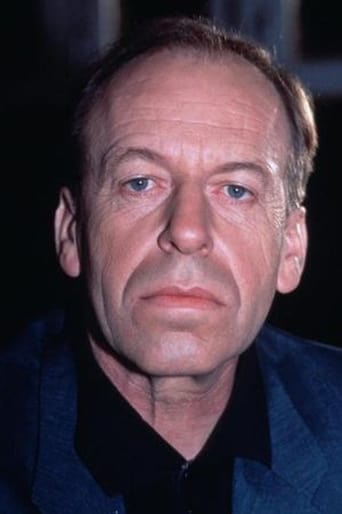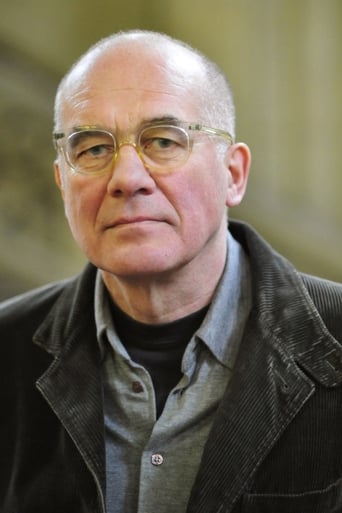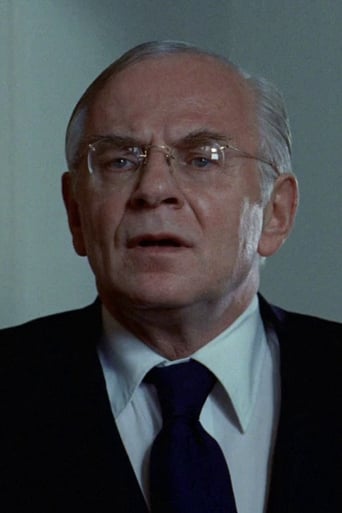Karry
Best movie of this year hands down!
Comwayon
A Disappointing Continuation
Gurlyndrobb
While it doesn't offer any answers, it both thrills and makes you think.
Jenni Devyn
Worth seeing just to witness how winsome it is.
Tom Gooderson-A'Court
Bruno (Rudiger Vogler) is a Cinema projector repair man who travels from town to town along the West and East German border repairing old cinema projectors. One day while shaving by the side of a road, a man drives his car at high speed into a lake, gets out and walks over to Bruno. Bruno, not knowing what else to do laughs at the man and offers him some clean clothes. The man, Robert (Hanns Zischler) hitchhikes with Bruno from town to town beginning a strange and often uneasy friendship.The film has several themes which jump out at you and are present throughout. The first is a love of cinema and anger at what has become of the small German cinema. Most of the cinemas that Bruno visits are either badly run, have been turned into porn theatres or are closed altogether. This is director Wim Wenders way of showing viewers what is happening to small cinemas. It is a problem which over thirty years later is still present in my own country. Occasionally Bruno will come across a small, old theatre run by an ex Nazi that is run with care and dedication. A place where old, noisy machines are used by artisan projectionists to show the great classics of the 50s and 60s but generally he deals with people who have no interest in film or it's proper projection. This film is very much a love letter to film.A second theme is that of loneliness. Both men are incredibly lonely. Robert's half hearted suicide attempt and constant depression is due to his loneliness after his wife has left him while Bruno spends his life on the road, in an old van, with no time for any love or affection from a woman. For large swathes of the film nothing is said but much is learned through glances and slight comments. It isn't until over an hour in that we discover what the characters names are and it is about two days after travelling together that the two men actually reveal their names. Both are used to silent existences. In one telling scene, Robert confronts his father about never being allowed to speak and we gain insight into why he is so silent.The third and final central theme is the Americanisation of Germany. This is a theme of the entire second half of the twentieth century but obviously something that affected West Germany in a large way. When talking about American music Bruno states that "The Yanks have colonized our subconscious". Although filmed and set in the mid 1970s it is still obvious that the Second World War is in the back of everyone's minds. Bruno lost his father to it, the elderly people were party members and the Americans still have a say in the daily lives of Germans who like Bruno and Robert were possibly not even born in 1945. There is a sense that the men and Germany as a whole have been castrated by American 'imperialism' and that is one of the factors in their introverted and non communicative personalities.A visual metaphor that Wenders uses is a railway. For much of the film, the men are seen to drive parallel to railways as though to indicate that they are remaining with the status quo and nothing is changing in their lives. In one telling scene, Robert has to cross the line to confront his father and in another he stands very close to it as a train passes, almost as if he is desperate to cross but can't quite manage it. It is as if the line is a barrier between their current selves and what they could be. This is confirmed in the closing scene in which the two men part company.Shot in black and white the film has the kind of hyper realism of Martin Scorsese's contemporary films. Wim Wenders goes a step further though and is not afraid to show the audience every part of a person's life. In one early scene Bruno is seen parking his van/home near a beach, walking on to the beach, squatting and defecating. The faeces are actually visible leaving his body. The scene is unexpected and shocking but makes you realise that you are seeing every part of this person's life and that nothing is being left out. In later scenes a cinema projectionist is seen to be masturbating, again showing the entire act and Robert is filmed urinating, once again hiding nothing. This hyper realism was unexpected and is responsible for the film's '18' Certificate in the UK. Was it necessary? No. But it let the audience know that nothing was being hidden from them.The plot itself is very slow and nothing much happens for a long time. It is the lack of communication that drives the tension rather than car chases or explosions etc. You almost want to reach into the film and start a conversation. The film also feels older than it is in part due to the black and white but also because the rural Germany in which the protagonists are driving through feels unchanged from before the war. The landscape of the towns reminded me of rural Slovakia, a country which today feels somewhat more 'backward' and less developed than Germany.The acting is very realistic and the script also adds to the realism. Wenders' shooting technique is visually arresting but the film is nearly three hours long and feels longer. It's a film that I'm glad I watched and would recommend to hardcore cineaste but a lot of people will find the film boring. I enjoyed it but could have done with an hour less of it.www.attheback.blogspot.com
Ilpo Hirvonen
Im Lauf Der Zeit (Kings of the Road - In the Course of Time) directed by Wim Wenders was his first own production (Wim Wenders Produktion). It's the third film of his road-movie trilogy (1st Alice in den Städten, 2nd False Bewegung) and it summarizes the bottom idea of the two films into a masterpiece. Yesterday I saw Im Lauf Der Zeit for the second time in theaters and loved it even more than the first time. The big screen achieved to maximize the emotion in it and it let the music express the scenes better.When they started filming this they actually didn't have a ready script. They kept writing the script chronologically while they were filming the movie and I think that's one of the main reasons, which created this amazing atmosphere for Im Lauf Der Zeit. After the film was ready they got a nearly three hour long road-movie film. In spite of the unplanned script writing the movie is full of small details and it is very well written, I wouldn't call it a masterpiece if it wasn't. The story builds around two men and their relationship. Robert Lander (Hanns Zischler), who has just divorced from his wife meets a projection mechanic Bruno Winter (Rüdiger Vogler) who travels from one dead movie theater to other. They decide to travel together and during the journey they see movie theaters falling apart and a modern country that is being americanized day by day.In the beginning Robert doesn't have a direction for his life, but instead Bruno has, he has got a clear list of theaters' projection equipment to fix. A clear direction for his life. During the journey they learn about life and start to find new things. They realize that if you want to be satisfied with your identity you must get over your past. The journey they travel together feels so natural, there's not a single mistake. This is a movie where you could actually cry. Not because of it's sadness, but because you can actually feel what the characters are feeling, you can almost touch them.The film, among friendship and society is about the difficulty of communication. You can see this in the minimal dialog in the film. For Robert communication is mostly writing, printing a newspaper with his father. Then for Bruno it is the language, German and English. Wim Wenders also researches man's identity in Im Lauf Der Zeit. When you're in a state where your identity breaks, you become afraid and vulnerable. If you open yourself up to another human being your identity is in danger, the playing-with-the-shadows scene is a good example of this.All the movie theaters Bruno and Robert visit in Germany are decayed. The theaters have fallen apart or have decided only to show porn-films. Still Wim Wenders gives an optimistic choice to film-industry as it does to its characters "Everything must change." In the beginning we see a man telling about the great times of silent movies and in the end we see a woman pitying the modern cinema and thinking is it worth to even keep theaters up for this. But then we have just seen Im Lauf Der Zeit, which is a great modern film and it's a proof of the fact that there's still hope in cinema.This is a long film with many layers, which is why people can write so long reviews of it. We could analyze it for days but these are the main themes I wanted to mention from Im Lauf Der Zeit. It's basically about the difficulty of communication, friendship, identity and about the loneliness in us all. Even that the film works on an artistic and intellectual level, I think it will appeal to all the people. Because in addition to it's artistry it manages to be more entertaining than any silly Hollywood comedy.10/10 Im Lauf Der Zeit as a three-hour long black and white road movie requires empathy, patience and a lot of heart from the viewer.
cloistermouse
I haven't seen this film for ages, but it is one of the ones that have stuck in my mind. Saw it twice in the 1980's when it seemed to be a cult art-house favourite. I thought Kings of the Road was a good title but perhaps the German "Im Lauf der Zeit" is more poignant, illustrating a theme that Wenders explores in his auteurly way to devastating effect in "Paris Texas"."In the Course of Time". Does this mean that in the course of time all relationships tend to disintegrate, due to bad faith. The guy's just broken up with his partner. He starts a friendship after a chance encounter with the travelling projector repairer. It ends in a punch-up. What a tragic view of life.There were a few memorable and amusing scenes, such as when a self-abusing cinema projectionist is confronted."Wings of Desire" was "Der Himmel ueber Berlin" in German. Apparently Wenders gave some thought to how his titles appeared in different translations.
jandesimpson
Wim Wenders's "Kings of the Road" differs from most road movies insofar as it does not quite conform to the conventions of the genre - a setting out, a journey and an arrival. Its two protagonists, Bruno, a cinema equipment maintenance mechanic and Robert, a pediatrician, have already commenced their journeys before the film begins and there is no clearly defined destination at the end. True, their initial encounter marks the beginning of a developing friendship but Wenders does not seem to be particularly interested in where it will take them, rather is it the minutiae of the journey itself that is all important. With a running time of three hours in which very little happens, it would be easy to dismiss the film as self-indulgent. But this would be to miss the point, which is a recreation of the rhythm of everyday life. In the case of Bruno we are aware of every little thing he does. He climbs naked out of his van. Later we watch him shave, and at one point we see him defecating in an open landscape in a middle distance shot held for as long as the act takes. Appropriately there are no such candid camera shots of Robert. He is an altogether more complex and private person. Estranged from his wife, he is clearly on the cusp of suicide when we first meet him. Playing "chicken" by closing his eyes while driving, he ends up in the river. He climbs out of his immobilized vehicle unaided, to be helped on his way by Bruno who is the only witness to the misadventure. The couple barely talk for some time, but a bond of friendship gradually develops between them so that Robert becomes Bruno's companion during his tour of cinemas in small towns on the East/West German border. And that is about all there is to it really. Except that the very feel of the flat landscapes, the river, the open road, level crossings and seedy cinemas takes one over, so that one hardly notices the minutes ticking away. This journey may be of little consequence but Wender's acute eyes and ears for detail make it one well worth taking.






